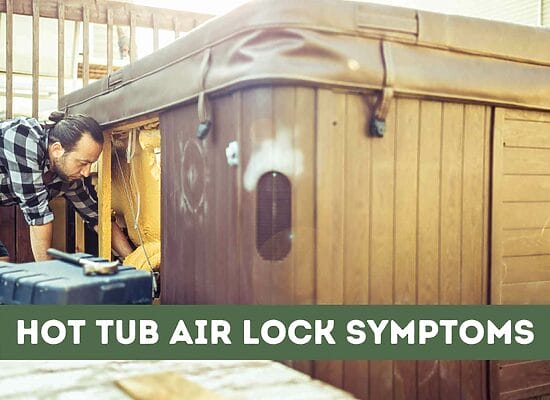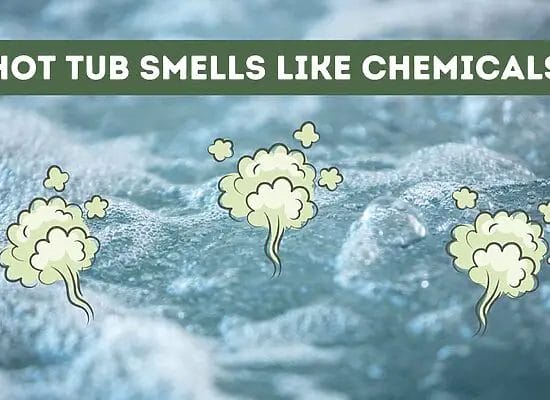
If you notice your hot tub smells like fish, there could be several factors causing the odor. Poor water quality caused by a lack of proper maintenance is the most common reason. Hot tubs are humid, moist, and warm, providing an ideal breeding ground for unwanted bacteria. To avoid bacteria growth, you must keep your water clean and your chemistry balanced.
A potential reason for a fishy odor in your hot tub could be the accumulation of bacteria in the water. This might occur if the hot tub isn’t cleaned routinely or if the filter isn’t changed frequently. Fishy odors can also arise due to sanitizer or pH level issues. It’s essential to identify the source of the odor and take the necessary steps to eliminate it.
Below, we’ll explore the common causes of a fishy-smelling hot tub and provide tips on how to eliminate the odor for good. With proper maintenance and care, you can enjoy a clean and fresh-smelling hot tub all year round.
Key takeaways:
- Poor water quality due to lack of maintenance is the primary cause of a fishy smell in hot tubs.
- Humid and warm conditions in hot tubs promote bacterial growth, leading to the fishy odor.
- Accumulation of bacteria from infrequent cleaning or unchanged filters can result in fishy smells.
- Imbalanced pH levels or inadequate sanitizer can contribute to the development of fishy odors.
- Fishy smell indicates potential health hazards such as bacterial infections and chemical exposure.
- Proper maintenance, balanced water chemistry, and regular cleaning are crucial to prevent fishy smells.
- Testing pH, alkalinity, and sanitizer levels, along with shock treatments, help maintain water quality and prevent odors.
Understanding the Fishy Smell in Hot Tubs
If you’ve noticed a fishy smell in your hot tub, you’re not alone. Many hot tub owners have experienced this foul odor, and it can be quite unpleasant. Understanding the causes of this smell and its health implications can help you take the necessary steps to eliminate it.
Common Causes of Fishy Smell
Several factors can contribute to a fishy smell in your hot tub. Here are some of the most common causes:
- Bacteria buildup: If your hot tub is not cleaned regularly, bacteria can accumulate and produce a sharp, pungent smell that resembles fish.
- pH level: A low pH level can cause the water to become acidic, which can lead to a fishy smell.
- Sanitizer: If the sanitizer level is too low, bacteria can grow and produce a fishy smell. On the other hand, if the sanitizer level is too high, it can cause a chemical smell that resembles fish.
Health Implications
A fishy smell in your hot tub can be more than just unpleasant. It can also indicate potential health risks. Here are some of the health implications associated with this smell:
- Bacterial infection: Bacteria that produce a fishy smell can also cause skin infections, respiratory problems, and gastrointestinal issues.
- Chemical exposure: If the smell is caused by high levels of sanitizer, it can cause skin irritation, eye irritation, and respiratory problems.
To avoid these health risks, it’s important to address the fishy smell in your hot tub as soon as possible. Regular cleaning, proper pH and sanitizer levels, and proper ventilation can all help eliminate this unpleasant odor.
Hot Tub Water Chemistry
Maintaining proper water chemistry in your hot tub is essential for keeping it clean and free of unpleasant odors. Here are some key factors to consider when it comes to hot tub water chemistry:
Role of pH and Alkalinity
The pH level of your hot tub water refers to how acidic or alkaline it is. Ideally, you want your pH level to be between 7.2 and 7.8. If the pH level is too high (above 7.8), it can lead to scaling and cloudy water. If the pH level is too low (below 7.2), it can lead to corrosion and skin irritation.
Alkalinity levels are also important to consider. Alkalinity acts as a buffer for the pH level, helping to keep it stable. You want your alkalinity levels to be between 80 and 120 ppm (parts per million). If alkalinity levels are too low, it can cause the pH level to fluctuate more easily.
Impact of Chlorine and Sanitizer Levels
Chlorine and other sanitizers are used to kill bacteria and other contaminants in the water. However, if the chlorine level is too high, it can cause skin and eye irritation. On the other hand, if the chlorine level is too low, it can lead to bacteria growth and cloudy water.
It’s important to test your water regularly using a testing kit to ensure that your chlorine levels are in the appropriate range (between 1 and 3 ppm). If you use bromine instead of chlorine, you want to aim for a level between 3 and 5 ppm.
Another thing to keep in mind is the presence of chloramines, which are formed when chlorine reacts with contaminants in the water. Chloramines can cause a strong odor and skin irritation. To get rid of chloramines, you can shock your hot tub with a high dose of chlorine or non-chlorine shock.
Identifying and Treating Bacterial Issues
If your hot tub smells like fish, it is a sign of bacterial growth in the water. Bacteria can thrive in warm and moist environments, like hot tubs, if the water is not properly sanitized and balanced. Here are some steps you can take to identify and treat bacterial issues in your hot tub.
Dealing with Algae and Mildew
Algae and mildew are common contaminants that can cause a foul odor in your hot tub. Algae can grow in the water if there is an excess of sunlight or if the sanitizer levels are too low. Mildew can grow on the surfaces of your hot tub if they are not regularly cleaned and sanitized. To deal with these issues, you should:
- Shock your hot tub with a high dose of sanitizer to kill off any bacteria and algae.
- Clean the surfaces of your hot tub with a mildew remover and a scrub brush.
- Ensure that your hot tub cover is properly fitted and sealed to prevent sunlight from entering the water.
Preventing Bacterial Growth
Preventing bacterial growth is key to avoiding unpleasant odors in your hot tub. Here are some tips for keeping your hot tub water clean and balanced:
- Regularly test the pH and sanitizer levels of your hot tub water.
- Maintain a sanitizer level of 1-4 parts per million for chlorine and 2-6 parts per million for bromine.
- Clean your hot tub filter regularly to remove any contaminants that could contribute to bacterial growth.
- Shock your hot tub with a high dose of sanitizer after heavy usage or if the water appears cloudy.
- Drain and refill your hot tub every 3-4 months to remove any buildup of contaminants.
Maintaining Hot Tub Cleanliness
Hot tubs are a great way to relax and unwind, but they require regular maintenance to keep them clean and safe. Proper maintenance is essential to keep your hot tub free from contaminants and unpleasant odors, such as the fishy smell that can occur when the water is not properly sanitized. In this section, we will discuss some routine cleaning procedures and the importance of draining and refilling your hot tub.
Routine Cleaning Procedures
To keep your hot tub clean, you should establish a routine cleaning schedule. This includes cleaning the filters, testing the chemical balance of the water, and adding the necessary chemicals to maintain the proper balance. Here are some tips for maintaining your hot tub:
- Clean the filters regularly: Dirty filters can lead to poor water circulation and can cause the water to become cloudy. You should clean your filters at least once a week and replace them every three to six months, depending on usage.
- Test the chemical balance: The chemical balance of your hot tub water is essential to maintaining a safe and clean environment. You should test the water regularly using a testing kit and adjust the chemicals as needed.
- Add the necessary chemicals: To maintain the proper chemical balance, you may need to add chemicals such as chlorine, bromine, or pH balancers. Follow the manufacturer’s instructions carefully, and never mix chemicals.
Importance of Draining and Refilling
Draining and refilling your hot tub is an essential part of proper maintenance. Over time, contaminants such as bacteria, oils, and dirt can build up in the water, even with regular cleaning. Draining and refilling your hot tub removes these contaminants and helps to maintain the proper chemical balance.
Here are some tips for draining and refilling your hot tub:
- Use a cleaning solution: Before draining your hot tub, use a cleaning solution to clean the surfaces and remove any buildup. Follow the manufacturer’s instructions carefully.
- Drain the water: Once you have cleaned the surfaces, drain the water from the hot tub. You can use a submersible pump or a hose to remove the water.
- Clean the filters: While the hot tub is empty, remove the filters and clean them thoroughly using a filter cleaning solution.
- Refill the hot tub: Once the hot tub is empty, refill it with fresh water. Be sure to follow the manufacturer’s instructions carefully and add the necessary chemicals to maintain the proper chemical balance.
Pro Tip: To make draining and refilling your hot tub easier, consider installing a drain valve or using a sump pump to remove the water. This can save you time and effort and make the process less messy.
Addressing Biofilm and Mold Issues
If your hot tub smells like fish, it is likely due to a build-up of bacteria in the water, which can lead to biofilm and mold growth. Understanding the causes of these issues and how to prevent and treat them can help you maintain a clean and odor-free hot tub.
Understanding Biofilm
Biofilm is a slimy layer that can form on the surface of your hot tub water and equipment. It is made up of bacteria and other microorganisms that are protected by the slime layer, making it difficult to remove with normal sanitation methods. Biofilm can cause a variety of issues, including clogged jets, cloudy water, and unpleasant odors.
To prevent biofilm from forming, it is essential to maintain proper water chemistry and sanitation levels. Regularly testing and balancing the pH, alkalinity, and sanitizer levels can help prevent bacteria growth and biofilm formation. Additionally, using a hot tub clarifier can help remove any existing biofilm and prevent new growth.
Preventing and Treating Mold
Mold growth is another common issue that can cause your hot tub to smell like fish. Mold thrives in warm, moist environments, making hot tubs an ideal breeding ground. Mold growth can cause a variety of health issues, including respiratory problems and skin irritation.
To prevent mold growth, it is essential to maintain proper water chemistry, keep the hot tub cover clean and dry, and regularly clean and disinfect the hot tub. If mold growth does occur, it is important to address it promptly to prevent further spread.
One effective way to treat mold growth is to drain and clean the hot tub thoroughly. Use a hot tub surface cleaner and a soft microfiber cloth to clean the hot tub shell and equipment. Additionally, replace any old or dirty filters and ensure that the hot tub cover is clean and dry before closing it.
Testing and Adjusting Water Quality
Maintaining the proper water quality in your hot tub is essential for preventing unpleasant odors like the fishy smell. Testing and adjusting the water quality regularly can help you keep your hot tub smelling fresh and clean.
Using Test Strips and Kits
Testing the water quality in your hot tub is easy with test strips and kits. Test strips are convenient and easy to use, and they provide quick results. Simply dip the strip into the water and compare the colors on the strip to the chart provided to determine the levels of sanitizer, pH, and total alkalinity.
Test kits are more accurate than test strips and are recommended for regular use. They typically include a color chart and reagents that you add to a water sample to determine the levels of sanitizer, pH, and total alkalinity. Regular testing with test strips or kits can help you maintain the proper levels of sanitizer and pH to prevent odors.
Shock Treatments and Spa Packets
Shock treatments are an effective way to eliminate odors caused by bacteria and other contaminants in the water. Shock treatments typically involve adding a high dose of sanitizer to the water to kill bacteria and other contaminants. Spa packets are pre-measured doses of shock treatment that are easy to use and provide quick results.
If your hot tub smells like fish, a shock treatment can help eliminate the odor. Be sure to follow the manufacturer’s instructions for the shock treatment product you use, and test the water after the treatment to ensure that the levels of sanitizer and pH are within the recommended range.
In addition to shock treatments, regular maintenance of your hot tub’s water chemistry is important for preventing odors. Maintaining the proper levels of sanitizer, pH, and total alkalinity can help prevent odors caused by contaminants like soap and chemicals.
Be sure to test the water quality regularly and adjust the levels of sanitizer and pH as needed to keep your hot tub smelling fresh and clean. Keeping the water quality in your hot tub balanced can also help prevent other issues like high calcium hardness and low water quality from your water supply.
Other Potential Causes of Fishy Smell
Aside from poor water quality caused by a lack of proper maintenance, there are other potential causes of a fishy smell in your hot tub. Here are some of them:
Issues with Hot Tub Covers
If your hot tub cover is waterlogged, it can create a musty smell that can be mistaken for a fishy smell. This is because the moisture can create an environment that is conducive to the growth of bacteria and mold. To prevent this from happening, make sure to remove the cover and let it dry out in the sun every once in a while.
Another issue with hot tub covers is that they can trap gases that are emitted from the water. These gases can create an unpleasant smell that can be mistaken for a fishy smell. To prevent this from happening, make sure to remove the cover and let the gases escape every once in a while.
If your hot tub cover is made of plastic, it can also emit a smell that can be mistaken for a fishy smell. This is because plastic can absorb odors over time. To prevent this from happening, make sure to clean your hot tub cover regularly with a mild detergent and warm water.
Other Factors
Other factors that can contribute to a fishy smell in your hot tub include using too many chemicals, such as chlorine, or failing to rinse off before getting into the hot tub.
To prevent a fishy smell in your hot tub, make sure to maintain proper water chemistry, clean your hot tub regularly, and replace your hot tub cover when necessary.
FAQ: Hot Tub Smells Like Fish
How can I get rid of the fishy smell in my hot tub?
To get rid of the fishy smell in your hot tub, first, check the sanitizer levels in the water. If the levels are low, add more sanitizer to the water. You can also shock the hot tub by adding a high dose of sanitizer to the water. This will help to kill any bacteria or contaminants that may be causing the smell. Additionally, you can drain and refill the hot tub with fresh water.
What causes a hot tub to smell like fish?
A hot tub can smell like fish due to several reasons. The most common reason is poor water quality caused by a lack of proper maintenance. Bacteria and other contaminants can build up in the water, causing a fishy smell. Another reason is the combination of chlorine and ammonia, which can create chloramines and cause a fishy odor.
Can bromine cause a fishy smell in a hot tub?
Yes, bromine can cause a fishy smell in a hot tub. Bromine is a sanitizer that is often used as an alternative to chlorine. If the bromine levels in the water are too low, bacteria and other contaminants can build up, causing a fishy smell. It’s important to maintain the proper levels of bromine in the water to prevent this from happening.
Why does my hot tub have an odor even with proper maintenance?
Even with proper maintenance, a hot tub can still have an odor. This can be due to several reasons, including low sanitizer levels, high pH levels, or high levels of total dissolved solids (TDS). It’s important to regularly test and adjust the water chemistry to prevent unpleasant odors.
What are some common causes of unpleasant hot tub odors?
Some common causes of unpleasant hot tub odors include poor water quality, low sanitizer levels, high pH levels, high levels of TDS, and the combination of chlorine and ammonia. Regular maintenance and testing can help prevent these odors from occurring.
Are there any natural remedies for eliminating hot tub odors?
Yes, there are natural remedies for eliminating hot tub odors. One option is to use baking soda to neutralize the pH levels in the water. You can also use vinegar to clean the hot tub and remove any buildup of bacteria or contaminants. Additionally, using essential oils like lavender or eucalyptus can help to mask any unpleasant odors in the water.












